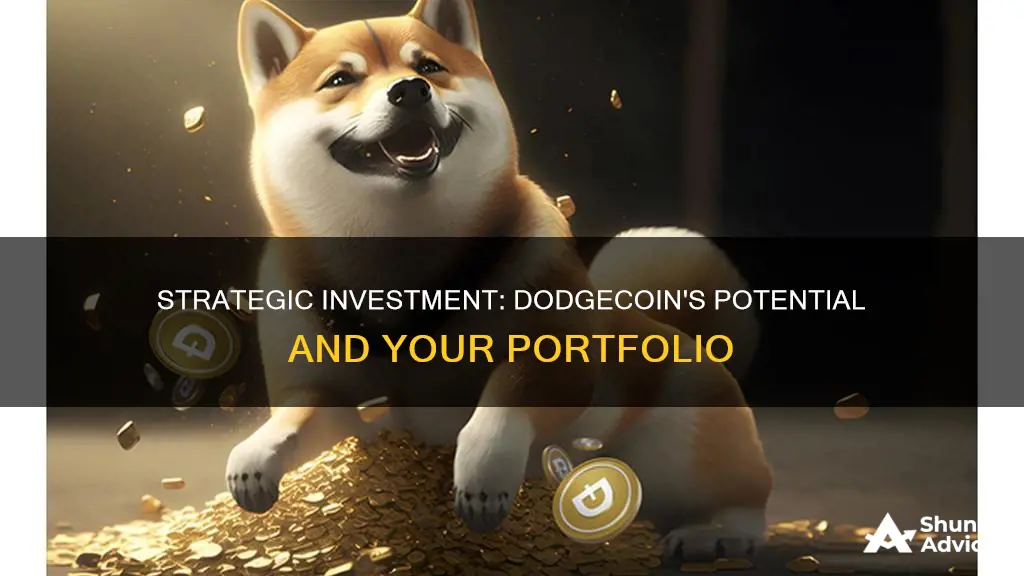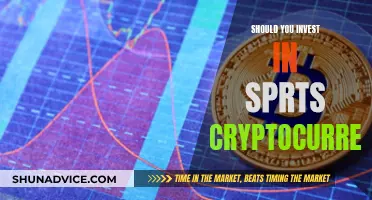
Dogecoin is a cryptocurrency that was launched in 2013 as a joke based on a popular meme character -- a Shiba Inu dog. It is one of the more controversial and talked-about cryptocurrencies. Dogecoin's value has increased by 2,400% in the past year, and it currently has a market capitalization of over $70 billion. However, it is considered a risky investment due to its volatile nature and lack of competitive advantage over other cryptocurrencies. While some people have made significant gains by investing in Dogecoin, it is important to remember that it is a highly speculative investment with no intrinsic value. Celebrity endorsements and social media hype have contributed to its popularity, but it is unclear if it has long-term benefits.
| Characteristics | Values |
|---|---|
| Type of Cryptocurrency | "Meme" cryptocurrency |
| Long-Term Investment | Not suitable |
| Short-Term Investment | Suitable for short-term traders willing to gamble |
| Volatility | High |
| Market Capitalization | Over $70 billion |
| Celebrity Endorsement | Elon Musk, Snoop Dogg, Mia Khalifa, Gene Simmons |
| Community | Large community of fans, including many new investors |
| Cost of Entry | Low |
| Risk of Loss | High |
| Decentralization | Lack of decentralization is a potential risk |
What You'll Learn

The pros and cons of investing in Dogecoin
Dogecoin is a controversial cryptocurrency that has gained a lot of attention and has a devoted community of fans. It is based on a popular meme character -- a Shiba Inu dog that speaks in broken English. Dogecoin was launched in 2013 as a joke to poke fun at the explosion of cryptocurrencies and the way people were investing in things they didn't understand.
Pros:
- Fun factor: Dogecoin has a playful and friendly community that creates and shares memes. It is less intimidating for beginner investors who are happy to be part of the club.
- Lower fees and transaction times: Dogecoin has faster confirmation times and lower transaction fees compared to other cryptocurrencies like Bitcoin.
- Potential for short-term gains: Dogecoin's value can increase rapidly in the short term due to its devoted community and viral nature. It has seen significant price surges in the past due to celebrity endorsements and tweets.
- Approachability: Dogecoin's low value, fun branding, and devoted community make it more approachable for people who are new to investing in cryptocurrencies.
Cons:
- Risk of loss: Dogecoin's value is highly volatile and susceptible to manipulation. There is a potential for investors to lose all their money, as the value can drop to zero.
- Lack of decentralization: Dogecoin has no supply cap, and its foundation could change its monetary policy, which introduces additional risk.
- Limited long-term potential: Dogecoin is commonly viewed as a less serious and highly speculative investment compared to other cryptocurrencies like Bitcoin. It is considered a short-term trading opportunity rather than a long-term investment asset.
- Network security: Dogecoin has lower network security compared to other cryptocurrencies, which can be a concern for investors.
Bitcoin or Ethereum: Where to Invest Now?
You may want to see also

Dogecoin's long-term viability
Dogecoin is a controversial cryptocurrency that was launched in 2013 as a joke based on a popular meme character—a Shiba Inu dog that speaks in broken English. It is a digital currency encrypted through blockchain technology, similar to Bitcoin. However, unlike Bitcoin, Dogecoin has an infinite number of coins.
Dogecoin's value is heavily influenced by media attention, celebrity endorsements, and community support. It has a passionate community of fans and investors who have completed several successful fundraisers. However, its value is largely based on popularity and speculation rather than any intrinsic value or widespread utility.
Additionally, Dogecoin has an unlimited supply, which could dampen long-term price appreciation compared to coins with capped supplies. This unlimited supply model presents long-term risks when compared to more established coins with limited supplies.
While Dogecoin has shown remarkable resilience, its future is uncertain. Its viability in the long term will depend on factors such as expanded merchant adoption, community growth, and protocol upgrades. The broader crypto market's performance will also significantly impact Dogecoin's trajectory.
In summary, Dogecoin may offer short-term gains due to its speculative and volatile nature, but it is not a viable option for long-term investing strategies. Its value is heavily dependent on media attention and community support, and it lacks the intrinsic value and widespread utility of other cryptocurrencies. Therefore, Dogecoin's long-term viability is questionable, and investors should approach it with caution.
Coinbase Alternatives: Exploring Crypto Investment Platforms
You may want to see also

How to buy Dogecoin
Dogecoin is a decentralised cryptocurrency created as a parody of Bitcoin. It has gained significant attention due to its meme-inspired branding and support from Tesla CEO Elon Musk. Dogecoin is a risky investment due to its high volatility, with billions of new coins minted each year.
Step 1: Sign up for a crypto exchange
Create an account on a well-known cryptocurrency exchange, such as Coinbase, Kraken, or Binance. Provide information such as your email address, name, and phone number.
Step 2: Verify your account
Verify your account with personal details like proof of address. You may also need to undergo a Know Your Customer (KYC) verification process, which may involve submitting government-issued identification documents and a proof of address.
Step 3: Deposit funds to your account
You can deposit money into your cryptocurrency account through various methods, including credit or debit cards, depending on the exchange's policies and your jurisdiction.
Step 4: Find DOGE, check the market price, and buy
Search for Dogecoin (DOGE) on the exchange, check its market price, and make a purchase. Generally, it takes less than a minute before you can see DOGE in your crypto exchange wallet. After purchasing, you can transfer your Dogecoin(s) to your other wallets.
Alternative ways to buy Dogecoin
You can also buy Dogecoin through peer-to-peer (P2P) marketplaces, which allow you to buy directly from other individuals instead of using a centralised exchange. These platforms match buyers and sellers and provide a secure escrow system to facilitate the transaction.
Another way is by exchanging Dogecoin with other forms of crypto in your wallet. For example, if you have Bitcoin or Ethereum, you can exchange them for Dogecoin on exchanges like Uniswap and Kraken. This method can be faster and more cost-effective than buying DOGE with fiat currency.
Elon's Dogecoin Bet: Millions Invested, a Crypto Future?
You may want to see also

The future of Dogecoin
Dogecoin is a controversial cryptocurrency that was launched in 2013 as a joke based on a popular meme character—a Shiba Inu dog. Dogecoin is similar to Bitcoin in that it is a digital currency encrypted through blockchain technology. However, unlike Bitcoin, Dogecoin has an infinite number of coins.
Dogecoin's value is highly volatile and is often influenced by celebrity endorsements, social media attention, and speculative trading. Its value increased by 2,400% in the past year, and it has a market capitalization of $7 billion.
On the other hand, Dogecoin's value is highly speculative, and it is often referred to as a "meme coin." Its creators, Jackson Palmer and Billy Markus, distanced themselves from the project in 2015 due to concerns about shady dealers and a toxic environment. Dogecoin also faces competition from more established cryptocurrencies like Bitcoin, Ethereum, and Litecoin, which have finite coin supplies and are seen as more serious investments.
Dogecoin's success in the future will depend on its ability to increase its utility beyond tipping and gain wider acceptance as a mainstream digital currency. Its longevity in the cryptocurrency space and strong community support are positive signs, but its value remains highly dependent on external factors such as celebrity endorsements and social media trends.
In the short term, Dogecoin's price is expected to fluctuate between $0.05 and $0.075 in 2024, with an average price of around $0.062. In the long term, Dogecoin's price is predicted to increase, with an average trading value of over $1 by 2032 and around $2 by 2035.
In conclusion, Dogecoin's future is difficult to predict due to its high volatility and dependence on external factors. While it has gained significant popularity and attention, it also faces challenges in terms of its reputation as a meme coin and competition from more established cryptocurrencies.
The Bitcoin Investment: Missed Opportunities and Lessons Learned
You may want to see also

Dogecoin's history
Dogecoin was launched on 6 December 2013 by software engineers Billy Markus and Jackson Palmer, who were working at IBM and Adobe Systems, respectively. The cryptocurrency was created as a joke, poking fun at the explosion of new currencies and the hype surrounding them. The creators based Dogecoin on the Doge meme, featuring a Shiba Inu dog, which was itself based on a 2010 photograph of a Japanese Shiba Inu called Kabosu.
Within two weeks, Dogecoin had established a dedicated blog and forum, and its market value reached $8 million, becoming the seventh-largest electronic currency in the world at the time. Dogecoin's popularity was driven by its community, which included a large following on Reddit. The community was also responsible for several charitable fundraising efforts, including raising $30,000 to send the Jamaican bobsled team to the Sochi Winter Olympics in 2014 and $30,000 for building water wells in Kenya.
Dogecoin has experienced significant price volatility since its launch. In 2013, its value surged by nearly 300% in 72 hours but subsequently crashed by 80% due to large mining pools exploiting its small computing power requirements. Dogecoin hit its lowest price on 6 May 2015, at $0.0000869, and reached a peak of 74 cents in May 2021, fuelled by endorsements from celebrities such as Elon Musk, Snoop Dogg, and Gene Simmons.
Dogecoin's infinite supply and lack of a supply cap, which differentiates it from other cryptocurrencies like Bitcoin, have been cited as reasons for its inflationary nature and its limited potential as a long-term investment. However, its low cost, fun factor, and community support continue to attract short-term traders and those seeking a "get-rich-quick" scenario.
The Ultimate Guide to Investing in Bitcoin
You may want to see also
Frequently asked questions
Dogecoin is a controversial cryptocurrency that was launched as a joke in 2013. It is highly volatile and is considered a short-term investment by some. Its value is easily manipulated and it has no real-world use. Dogecoin is not a good investment option if you are looking for long-term gains.
Dogecoin is built on blockchain technology, which verifies transactions and prevents double-spending. It has a faster transfer speed than Bitcoin and transactions are more secure.
Dogecoin is a highly speculative investment. If you are looking to invest in it, it is recommended that you only allocate a small portion of your portfolio to it.
Dogecoin's future is uncertain. It doesn't have any practical use and there is no cap on the number of coins that can be mined. Its value is largely driven by social media hype and celebrity endorsements, which may not be sustainable in the long term.







